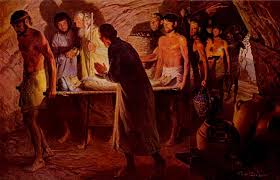Abraham Buried His Wife Sarah
in the Cave in the field of Machpelah
23: 19-20
Abraham buried his wife Sarah in the cave in the field of Machpelah DIG: How might Sarah have been eulogized at her funeral? What did Abraham’s purchase of a burial site in the Promised Land prove?
REFLECT: Do you have a family burial site like Abraham and his family? What are people going to say about you at your funeral? Where is your true home?
Sarah and Abraham never found a place to call home. In fact, the only piece of land they ever owned was the plot Avraham bought to bury Sarah.

After all the legal transactions were completed, Abraham buried his wife Sarah in the cave in the field of Machpelah near Mamre (which is Hebron) in the land of Canaan. The city of Hebron is in the hill country of Judea, about half way between Jerusalem and Beersheba. Mamre is about two miles north of Hebron. Today there is a mosque built over this cave, and it is considered one of the most important mosques in Islam. So the field and the cave in it were deeded to Avraham by the Hittites as a burial site (23:19-20). The fact that Abraham purchased a burying place in strictly legal form as a hereditary possession in the Promised Land, was proof of his strong faith in the promises of God and their eventual fulfillment.376
There seems to be a contradiction between this passage, Stephen’s statement in Acts and a statement from Joshua. There were two different family plots about forty miles apart. One purchased by Abraham near Mamre and the other by Jacob at Shechem. First, let’s look at Stephen’s statement. Then Jacob went down to Egypt, where he and his brothers died. Their bodies were brought back to Shechem and placed in the tomb that Abraham had bought from the sons of Hamor at Shechem for a certain sum of money (Acts 7:15-16). After Sarah died, Abraham lived another thirty-eight years. During that time he met and married a woman named Keturah and had six more sons! The tomb that Abraham had bought was for his second family, in the region near Shechem, where he had built his first altar in the land of Canaan (12:6-7). When Abraham died, however, he was buried with Sarah in Mamre. Keturah and her sons may not have retained possession of the Shechem property, selling it or losing it somehow to the occupying people of Hamor. Then, about eighty-five years after Avraham’s death, when Jacob came to the region of Shechem, knowing that the land had once belonged to his grandfather, he bought it back again. And because Abraham had once built an altar there, Jacob then did the same thing. For a hundred pieces of silver, he bought from the sons of Hamor, the father of Shechem, the plot of ground where he pitched his tent. There he set up an altar and called it El Elohe Isra’el (33:19-20).
Secondly what did Joshua have to say about it? He said: And Joseph’s bones, which the Israelites had brought up from Egypt, were buried at Shechem in the tract of land that Jacob bought for a hundred pieces of silver from the sons of Hamor, the father of Shechem. This became the inheritance of Joseph’s descendants (Joshua 24:32). As mentioned above, Jacob had purchased the land at Shechem to build an altar. He retained possession of it, but he wasn’t buried there. When Jacob died he was buried in the cave in the field of Machpelah near Mamre. Sarah was the first to be buried there. But later she was followed by Abraham (25:9), Isaac (35:27-29), Leah (49:30-31), and finally Jacob (50:13). Joseph inherited the land at Shechem from Jacob. When Joseph died, his descendants brought his bones back from Egypt and buried him at Shechem. Eventually, Joseph’s brothers were also buried there along with Keturah and her sons. Thus, there were two family plots, one in the field of Machpelah near Mamre (which is Hebron), and the other at Shechem.377
Abraham knew he still had a family burial place back in Mesopotamia (22:20-24) and he could have had Sarah’s body transferred there, but burying Sarah in the land of Canaan was saying that Mesopotamia was no longer their home. I am sure Sarah felt the same way, and no doubt they had discussed this many times together. The Promised Land of Canaan was now their future and the future of their family. There was no looking back.
In death, the patriarchs were victorious in a way that escaped them in life. Though their voices grew silent, their grave site could not prevent them from entering into the promises of God. In this way they are examples to us all.378 Each one of these people of faith died not yet having in hand what was promised, but still believing. How did they do it? They saw it way off in the distance, waved their greeting, and accepted the fact that they were transients in this world. People who live this way make it plain that they are looking for their true home. If they were homesick for the old country, they could have gone back any time they wanted. But they were after a far better country than that – heaven country. You can see why God is so proud of them, and has a City waiting for them (Hebrews 11:13-16, The Message).



Leave A Comment